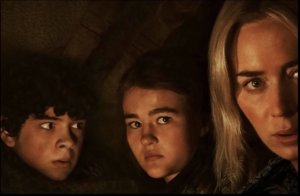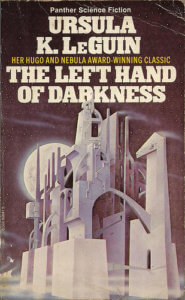Posts by Susi Jensen
A QUIET PLACE II, A No-Spoiler Review
Worthy of a trip to the movie theater. I say yes!
A QUIET PLACE II was the first film I watched in a theater after receiving the COVID vaccine. It was a joyous occasion on many levels and worth a trip to the theater. The suspense and scare moments are best viewed when in a large, dark room, alongside a bunch of others who will scream in unison with you. We ventured into a theater in Madison, Wisconsin last night, our mask mandate having been lifted the day before. (Dane County has one of the highest vaccination rates in the country).
Here are 5 reasons this film is worth the price of the ticket:
- This is true scifi (in the spirit of Ridley Scott’s Alien, AKA monster versus human)
- The storytelling is intimate in the best possible way, focusing on one family scrambling to survive in a nearly impossible world
- Jump out of your seat moments, but without the extreme gore often found in the horror genre
- A longer story arc that builds tension and keeps the audience longing for more
- A dynamic deaf actress who plays a deaf character. An amazing role and an amazing performance by Millicent Simmonds
A QUIET PLACE II is rated PG-13. Mature teens could handle this if they like horror. Again…this is not gory horror, but it will likely give little tykes nightmares.
I must say, the group of us were giddy and joyful to be walking into the theater again after so many months of Netflix and Amazon Prime and Disney Plus, etc, etc, viewing by ourselves in our little hovels. The theater felt glorious and expansive.
Some economists ponder whether or not the movie theater will die as a result of our streaming habits (already in process before Covid). If last night is any indication, I would say no. Some films need to be viewed in community, and in a massive, dark space.
A QUIET PLACE II did not disappoint.
All of us in our party had see the first installment. All of us had been pleasantly surprised with the quality of the story in that first film. Always suspecting the sequel will be lame, we didn’t venture into the theaters until we heard from critics and viewers that this second film was both consistent with the vibe of the first (did not lose its heart) yet deepened the overall tension. A third installment is being shot as I write.
I highly recommend you view the first film before going to the second. Here is my review of A QUIET PLACE
You can rent this first film on Amazon Prime for $3.99.
After which I highly recommend you view the second film and be prepared for a few jump-out-of-your-seat moments and a wonderful theater experience overall.
THE HOBBIT, Chapter 1…A Study on Craft

For educators: This post and others like it are appropriate for a student who wants to improve in storytelling and/or writing stories. However, most of my writing posts contain spoilers. I recommend the student read the book first.
This is my second installment on first chapters. A few days ago, I analyzed chapter 1 of DUNE. To read that post, click here. Today, I analyze chapter 1 of THE HOBBIT.
This first chapter
–introduces the reader to the world and the main characters
–evokes reader empathy for Bilbo by showing Bilbo’s inner conflict
–presents the choice that will change Bilbo’s life forever
–introduces the reader to the fantastical possibilities that lie ahead, but also the dangers
In a hole in the ground there lived a hobbit. Not a nasty, dirty wet hole, filled with the ends of worms and an oozy smell, nor yet a dry, bare, sandy hole with nothing in it to sit down on or to eat: it was a hobbit-hole, and that means comfort.
Thus begins THE HOBBIT, by J.R.R. Tolkien, but really this sentence begins the longer saga that so many have come to know and love, THE LORD OF THE RINGS. Notice what it accomplishes.
- Sentence #1 introduces a new creature, the hobbit. This creature will inhabit the long saga. Bilbo first will be the unlikely hero (later his nephew, Frodo takes over the hero’s mantle). The audience will come to admire, adore and identify with Bilbo and Frodo.
- This sentence begins to describe the culture of hobbits. They are earthy, living in holes, but absolutely committed to cleanliness and comfort. These creatures are civilized…they just happen to like holes as their place of abode.
- In this first sentence, Tolkien begins to evoke our empathy for Bilbo, who will soon trade in his life of comfort for a wild and magical adventure.
Paragraph #2 of THE HOBBIT describes Bilbo’s home in detail, which will be the place where all the action takes place in the remainder of the chapter, including the entertaining of a wizard and a large group of dwarves, but even more than that, this home represents the comfortable life of a gentleman. Later in the story, Bilbo often longs for home (as does Frodo in the LOtR saga) as a place of rest, comfort and peace. It is a place to return to.
Paragraph #3 and #4 describe Bilbo’s ancestry, posing the curious conflict he bears within himself. There is a debate between the Baggins and the Took within Bilbo. The Took side of his family (Bilbo’s mother’s side) is prone to adventure and risk-taking. The Baggins side of the family (Bilbo’s father’s side) is conservative and would reject adventure and any controversy at all. The reader doesn’t have to wonder for very long which side will win out. Without that Tookish spirit, Bilbo might never have walked away from his comfortable hobbit hole.
Both impulses inhabit Bilbo and most readers can relate. It might be said that opposing impulses, such as what Bilbo experiences, are a part of every person. Thus, Tolkien evokes our empathy for Bilbo in chapter 1. Much as Bilbo leaves the comfort of his hobbit hole to journey with the dwarves, the reader leaves his/her comfort to embark with them in the story world.
Now for the rest of chapter one: Bilbo, because he values hospitality, entertains Gandalf (a wizard who believes Bilbo will be a key member of the adventure) and a group of dwarves who demand food, drink, then compel him to travel with them to a place where a dragon guards a great treasure. The adventure, as it is presented, is magnificent, romantic and promises great wealth. Bilbo is taken in, though it is touch and go for a while whether or not he can bring himself to leave his Hobbit hole. Despite his willingness to leave his home, it could be said the hobbit is in a way bewitched by the romantic notion of a grand adventure.
As they sang the hobbit felt the love of beautiful things made by hands and by cunning and by magic moving through him, a fierce and jealous love, the desire of the hearts of dwarves. Then something Tookish woke up inside him, and he wished to go and see the great mountains, and hear the pine-trees and the waterfalls, and explore the caves, and wear a sword instead of a walking-stick.
Yet, Thorin, the lead dwarf, does not mince words about the dangers they might face.
We shall soon before the break of day start on our long journey, a journey from which some of us, or perhaps all of us (except our friend and counsellor, the ingenious wizard Gandalf) may never return. It is a solemn moment.
What is Bilbo’s reaction to this sobering news?
Poor Bilbo couldn’t bear it any longer. At may never return he began to feel a shriek coming up inside, and very soon it burst out like the whistle of an engine coming out of a tunnel. All the dwarves sprang up, knocking over the table.
The stage has been set. The semi-cowardly and ill-prepared Bilbo Baggins will reluctantly leave his comfortable hobbit hole and venture with these new friends, the dwarves and Gandalf. When he finally returns, he will be completely changed and so will Middle Earth.
For over the misty mountains cold
To dungeons deep and caverns old
We must away ere break of day
To find our long-forgotten gold.
Bilbo went to sleep with that in his ears, and it gave him very uncomfortable dreams. It was long after the break of day when he woke up.
This stanza, when one reflects on THE HOBBIT and THE LORD of the RINGS speaks of long-forgotten gold. The dwarves believe this to be part of their hoard, that which is guarded by the dragon, Smaug. The reader understands a deeper meaning. Long-forgotten gold is the one ring to rule them all, found by Bilbo…later passed on to Frodo, becoming the impetus for the Lord of the Rings Saga.
The reader doesn’t understand at this point the profundity of the dwarves’ song, but it is there, imbedded in that first chapter of the very first book.
DUNE, Chapter 1. A Study on Craft
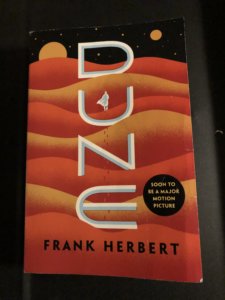
For educators: This post is appropriate for teens who have read Dune and might want to to improve their storytelling/writing skills.
I happen to be in a writing critique group that started up this past week. A couple of the folks in this group are writing novels and sent in first chapters for a swipe at getting feedback. So, I read a few first chapters yesterday and in the course of my reading, I began to wonder…Do these seem like first chapters to me? How do I feel as a reader as I am taking in the narrative for the first time? Do I begin to have a strong sense about the story, the characters and about the writing style? Absolutely. I did and do have feelings and ideas. Some of those made me want to keep reading. Others did not.
That led me to the question: How does a novelist write a brilliant chapter one that makes you want to keep reading?
I wonder about my own first chapter, the beginning of my novel that is undergoing an extensive edit. What is it accomplishing and what is it not accomplishing? Have I done the necessary work to hook my reader, keep them interested and engaged, settle them into the world I am creating?
All writers of any genre ponder this question when they sit down before the blank page because the possibilities are endless, as endless as stories themselves. However, I do think there are ways to understand first chapters, to critique and edit them for the purpose of making them better.
Therefore, I begin a series of posts devoted to the question of beginnings. My focus will be on science fiction and fantasy novels and the hope is not to be prescriptive. Telling the writer what to do or not do detracts from originality and art. However, paying attention to how great authors craft a narrative is worthwhile. We learn from the greats. Study enough greats and we begin to see common threads.
So, my goal in this series of posts is to plunder first chapters and see what I can glean about my own writing and will record my findings for the sake of other writers.
 A Look at DUNE, Chapter 1
A Look at DUNE, Chapter 1
Frank Herbert is a great writer and though the novel DUNE isn’t perfect, it’s very close to perfect. How does that first chapter set us up for a marvelous journey?
I see it accomplishing four things.
Chapter 1…
-Gives us a sense of the setting in which the story will take place
-Introduces the primary characters, even putting the main character through a first test
-Hints at the coming conflict
-Tantalizes the reader with compelling mysteries that make you want to keep reading
Chapter 1 of DUNE give us a sense of the setting.
Here is the first sentence of the novel.
In the week before the departure to Arrakis, when all the final scurrying about had reached a nearly unbearable frenzy, an old crone came to visit the mother of the boy, Paul.
Most of us have experienced moving houses, cities, states. We know what it feels like to change locations. In this first sentence of DUNE, the reader is alerted immediately to the fact that a change in location is taking place for this particular family, for this particular person, Paul. Moving is disruption. Paul’s family is about to be disrupted. He will soon be leaving Caladan for a planet called Arrakis, sometimes called Dune.
Soon after, in the early paragraphs, Herbert repeats this series of words three times as paragraphs. They jump out on the page like a refrain. They are written in italics, which in Herbert’s style, represents thought. Paul, the main character continues to mull over this reality.
Arrakis—Dune—Desert Planet
So, not only will Paul be leaving his current location, but the new location is harsh. There is a sense of foreboding about this desert planet. Paul will move from Caladan, a land where water is plentiful to Arrakis, where water is scarce. Caladan is known, comfortable, secure, a virtual paradise. Arrakis is mysterious, uncomfortable in so many ways, in part because of its climate. Climate will be a large issue in the rest of the novel. Herbert wants the reader to begin thinking about ecology and its importance to a planet and a people.
Here is the second sentence of DUNE.
It was a warm night at Castle Caladan, and the ancient pile of stone that had served the Atreides family as home for twenty-six generations bore that cooled-sweat feeling it acquired before a change in the weather.
When Paul’s family leaves Caladan, they are not only leaving their current comfortable home/castle, but they are leaving their home of twenty-six generations. This move is an epic move. The reader is left asking…why? Why leave this lovely planet and this home of so many years? We get a few clues as to why this move it taking place. Power and political maneuvering are introduced, a profound subject of the story.
Thufir Hawat, his father’s Master of Assassins, had explained it: their mortal enemies, the Harkonnens, had been on Arrakis eighty years, holding the planet in quasi-fief under a CHOAM Company contract to mine the geriatric spice, mélange. Now the Harkonnens were leaving to be replaced by the House of Atreides in fief-complete—an apparent victory for the Duke Leto. Yet, Hawat had said, their appearance contained the deadliest peril, for the Duke Leto was popular among the Great Houses of the Landsraad.
Arrakis is the place where the empire derives its most important resource: Melange, or spice, as it is sometimes called. Melange is the secret to space travel in this particular universe.
We can already see now how the chess pieces are stacking up, a sense of the conflict.
This brings us to the second accomplishment of Herbert’s chapter one, the introduction of most of the main characters.
Paul is mentioned in the first sentence. So is his mother. Paul’s mother and Paul are on the stage for the very final scene of the novel as well. In fact, his mother gives voice to the final paragraph/speech.
Not only that, but the crone mentioned in that first sentence, the one who will test Paul later in the chapter, will also be on that stage at the finale. This is great writing.
Add to the list the Bene Gesserit, the Fremen, House Harkonnen…all are mentioned, Thufir Hawat, (who will be present in the final scene) and Dr. Yueh, important as the one who betrays House Atreides…all are introduced in chapter 1.
Note this paragraph early in the chapter.
Paul awoke to feel himself in the warmth of his bed—thinking…thinking. This world of Castle Caladan, without play or companions his own age, perhaps did not deserve sadness in farewell. Dr. Yueh, his teacher, had hinted that the faufreluches class system was not rigidly guarded on Arrakis. The planet sheltered people who lived at the desert edge without caid or bashar to command them: will-o’-the-sand people called Fremen, marked down on no census of the Imperial Regate.
The Fremen will become important to the story, of primary importance, but the reader is simply introduced here. There is mystery surrounding these people. I am curious. I want to learn more and Herbert will plunge me into Fremen culture before too long.
It’s interesting to note who is left out of chapter 1.

Chapter 1 hints also at future conflict.
As Paul is undergoing the test, the gom jabbar, here is what the Reverend Mother, the crone says to him.
The old woman said: “You’ve heard of animals chewing off a leg to escape a trap? There’s an animal kind of trick. A human would remain in the trap, endure the pain, feigning death that he might kill the trapper and remove a threat to his kind.”
As I was re-reading the chapter last night, this nugget stopped me in my tracks. I had not realized, not seen how this Reverend mother quote foretells the remainder of the story.
Paul does feign death on Arrakis, so that he might kill the trapper and remove the threat to his family. That is, in essence, a summary of the novel. These two sentences are so brilliantly placed, subtle in all the best ways. We don’t understand consciously upon first reading, but Herbert has just told us what we can expect.
Lastly, chapter 1 teases the reader with mysteries.
This is an odd world, a mysterious one in which a mother of an only son, will give him up to a religious figure, knowing he might die.
Jessica stepped into the room, closed the door and stood with her back to it. My son lives, she thought. My son lives and is…human. I knew he was…but…he lives. Now, I can go on living.
This we absorb and I, at least, want to read to find out more about this bizarre world where such a thing would happen. In order to know more, I must keep reading.
Then, there is the planet Arrakis and the Fremen. In chapter one, we learn very little about them, but we wonder about them as Paul does. The planet is a desert and the Fremen seem to live off the grid. They are wild and uncounted by the empire. Who are they? We are meant to wonder, and to find out, I have to keep reading.
And lastly, in Chapter 1, Herbert introduces the reader to the idea of the Kwisatz Haderach, a messianic figure. Is Paul the Messiah? The reader suspects he is, though Paul himself struggles with this identity throughout the novel, mysterious even to him. We will have to keep reading if we want to figure out the true identity of the Kwisatz Haderach.
So…all of this in Chapter 1. I am wowed and I am hooked. I am also set up well in the world to take in more of the details as they unfold. Moreover, I have enough sense of the main characters to be able to navigate this complex world where many more characters will soon be introduced. It makes me wonder how many times Herbert went back to edit and perfect his beginning…because I don’t think he could have written a better version than the one we read today.
DUNE, A Review of the Novel

DUNE, the novel holds up well to post-modern scrutiny and the writing is mostly perfect.
This is a PG-13 story, for sexual and violent themes, although those scenes are not explicit in this novel.
The Short Review
5 Reasons the Science Fiction Fan Needs to Read this Book Now
- DUNE, the film will be released in 2021…at least the first film of two will be released…unless pandemic interferes. In this case as in most, I recommend reading before viewing
- Compelling villain and compelling hero, with complex motives for each
- Dynamic characters around the main character, including a number of strong females
- Among the best world-building you will find in science fiction
- Without simplifying the complexity of good versus evil, this story gives the reader a vision of truth, goodness and honor
The Longer Review (mini spoilers below):
When George Herbert created the character Paul Atriedes, he stumbled upon a savior-type, a hero, a character who could embody a kind of leadership that most of humanity longs for. Hero stories are nothing new, certainly not new to the science fiction audience, but great ones are to be treasured.
In the case of DUNE, Paul is not the only treasure. The people of the planet Arrakis, the Fremen, also embody an ideal. They are oppressed, but intelligent, pushed to the margins of society, but resourceful and willing to sacrifice for the cause. Their discipline is akin to the greatest armies of literature and history. They are as creative as tenacious as a Roman legion, as fierce as Khan’s Mongols and as disciplined as the Spartans.
(Spoiler here) So what is supposed to get under our skin about DUNE? How can one argue with a story where the overly confident and utterly powerful Emperor is outsmarted, out-gunned and defeated by an honorable and humble tribal people? That feels so right and good.
But there are complexities that go along with this storyline. Paul is not as pure a hero as he might seem. His role as Messiah is an idea that plagues him throughout the novel because he knows he is not simply fighting for the Fremen. He is also motivated by vengeance and honor. He uses the Fremen to avenge his father, so his victory is an uneasy one. Even as he negotiates a marriage to the Emperor’s daughter for status and honor, but keeps his Fremen lover as concubine, the audience sees the inherent politics that will inhabit Paul’s governing. How Paul will rule the Empire is a story for later books, but the seeds of the struggle are sown well and deep in the original novel. So, even as the audience breathes relief at the victory over injustice, there is more to ponder.
To purchase the novel, click DUNE
There is also an amazing graphic novel version which is being released book by book. Dune is made up of three sections, called books. The first installment in graphic novel form is available here. To purchase, click DUNE, Graphic Novel The second installment will be released in the Spring of 2022. No date yet on the third and final.
Lastly, the 2021 theatrical trailer is out and worth a view, perhaps best seen after reading the novel…but then, maybe not.
Click here to see DUNE, film trailer
TRAIN TO BUSAN, A No Spoiler Review
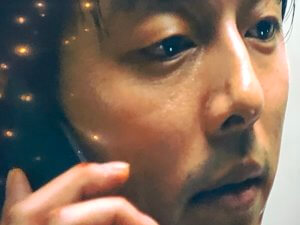
TRAIN TO BUSAN, set in Korea, is subtitled for English (and other language) speakers. This film was written for the screen by Sang-Ho Yeon and Joo-Suk Park and directed by Yeon. The film would probably receive a PG-13 rating for gore, the zombie kind, nothing worse that what you might see on AMC’s The Walking Dead. You can view this film for free if you are an Amazon Prime member. I loved it. In fact, I think the writing is brilliant.
Click here for the film’s trailer.
 Short Review. Five reasons I highly recommend TRAIN TO BUSAN
Short Review. Five reasons I highly recommend TRAIN TO BUSAN
- Perfect writing/storytelling, including the pacing that ramps up quickly at about 10 minutes in
- Sympathetic characters. The father/daughter story at the heart puts this zombie flick in a category above most others
- Another fresh setting. By now, if you’ve read a few of my reviews, you know I am an advocate of consuming stories told outside of the Hollywood bubble
- Once the action starts, it doesn’t stop and much of it takes place in the close confines of a train or a train station
- A pitch-perfect ending
Longer Review

Seok-woo, a divorced father of one 10yo (or so) daughter, Soo-an, is a fund manager who works long hours. While he works, his mother cares for his daughter. They are based in Seoul, Korea. On the day the audience meets this family (the first minutes of the film), Soo-an is anticipating her birthday on the following day. She longs to be with her mother on her birthday. The problem, her mother lives in Busan, so Seok-woo must decide if he will accompany his daughter to Busan during a time when he is overwhelmed with work. He decides he will. In the first minutes, the audience has learned he has NOT been the most attentive father due to his demanding job. Is it guilt or something else that urges him to make this decision?
The decision is a sacrifice from his perspective, though he assumes he will be able to go very early in the morning, deposit his daughter in Busan and still return to Seoul to work a half day. The train trip (normally) is about 3 hours.
However, as they embark on the journey, a few unusual situations emerge, scenes the audience anticipates and knows are signs of something gone wrong.
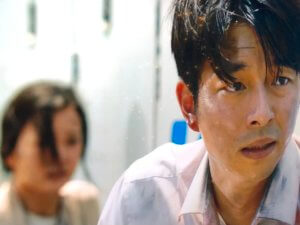
The rest of the narrative is not a simple zombie story. Seok-woo must fight and learn to sacrifice, not just for his daughter, but for others. While he journeys, he will have many teachers, including his daughter. Amid all the stress, he grows and changes.
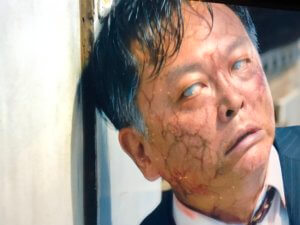
So, You Just Finished Writing a 70K Word Sci-Fi Novel…Advice to the Young Writer

So, I had the phone conversation with a young man (son of an old friend) yesterday. I decided to write him a follow up email with a few resources I have appreciated and it made sense to put it into a post. Next time, I can just send the link. Actually…I wouldn’t do that. I would still take the phone call, but it helps to have the information written down in one place.
For the new writer…Here’s my advice:
First, congratulate yourself that you just wrote a novel. That.Is.Amazing. Celebrate and then think like a critic and move on. Try to figure out if this book is what you really want to publish and to the best of your ability, think about whether or not you’re addicted to writing. If you’re not, the road is too hard and very long (for most of us). Don’t keep going unless you know you really LOVE it.
Social Media. You might hate it, but every author has to be on social media. If you want to start somewhere, try Twitter.
On Twitter, connect with and start following folks from the #WritingCommunity. Other hashtags you could check out: #amwritingsciencefiction, #amwritingspeculativefiction, #amwriting, #amwritingfiction. While you’re there you’ll find links to various author websites. Some are way more amazing than mine, others are just a page with a photo and the book cover, with minimal links if any. Begin thinking about your author website. How do you want it to feel? What content, if any, do you want to regularly produce on it?
Find a Critique Group:
It’s great to have beta readers, but it’s even better to find a group of writers, like-minded souls who write and will be willing to read your stuff and give you feedback. I’ve started a number of groups over the years. What I have found is that the most important trait for those in the group is work ethic. If the people aren’t actually writing, then it’s probably not worth your time because A. they won’t submit anything to the group and B. They will be the weakest when it comes to critique. Find people who write and be willing to put in the work for them by being a thorough and honest critic. Work for them and they will work for you. (That’s ideal…always exceptions, but be careful about those exceptions).
Go to Cons (like Emerald City Comic Con or WisCon) and get to know people. You will meet fans and you will meet writers and small publishers. You will make connections and you will have fun. (Photo of Ariel is my daughter, who goes to Cons and always dresses up, mostly not in Disney costumes, but this was the best photo I could find today…plus, it’s bright and cute.)
Books on writing and why I like them:
Story: Structure, Substance, Style and the Principles of Screenwriting by Robert McKee
If you buy one book, I would make it this one. I’ve taken McKee’s class twice (weekend course) and everyone from Pixar would attend in the Bay Area (where I used to live). Screenwriters would fly up from LA to take it in case they had missed the weekend in Southern California. I knew writers who would take it every other year during the time he was touring. He traveled all over the world teaching his course in the 90s and early 2000s. Why? I think he had/has a way of distilling what it takes to tell a great story. It’s less literary and more about structure, the architecture of good storytelling. I refer to this book all the time, also because this was the stuff I never learned in college. For whatever reason, my writing program de-emphasized story structure. Maybe they thought we were smart enough to pick it up, sniff it out and do it ourselves.
*Why don’t I have a photo of this book cover? I have loaned it out…which so many of us writers inevitably do and then regret. That book has escaped my shelves. I have no idea who has it now, so I will probably have to buy it again. DRAT! It’s not cheap!
Steering the Craft by Ursula K. le Guin

le Guin has written a wonderful series, 5 fantasy books (long before Harry Potter) about a wizarding school, called
If you don’t want to buy all five, try out the first one.
UK le Guin is one of my heroes. Here is my review of her science fiction book, THE LEFT HAND OF DARKNESS, A Book Review
The ART of Character by David Corbett
This book (pictured on the top of post) drives home the kinds of techniques that make characters eternal/memorable. It too is practical. The chapter on Protagonist Problems is spot on and one of the best things you can read as a young writer. Corbett captures key mistakes many writers make when crafting characters, especially main characters.
Revising Fiction, by David Madden
EQUILIBRIUM, A No Spoiler Review
During COVID, I have been watching older science fiction films, whose theatrical release I might have missed. EQUILIBRIUM falls into that category. Written and directed by Kurt Wimmer, starring Christian Bale, Sean Bean, Taye Diggs and Emily Watson, this film is rated R for violence, released in 2002. You can rent it as an Amazon Prime member for 4 dollars.
I recommend this film. It’s not the most thoughtful science fiction around, but it was entertaining on a few levels.
Short Review, 4 Reasons to watch
- Christian Bale gives a nice performance
- The one idea that drives the plot does create tension and makes the audience think at least a little…(see longer review)
- Stylized fight scenes–if you like martial arts/Matrix type battles
- Tight, linear story…easy to follow (given I just watched Tenet in the theater, it’s nice to watch a film that is relatively straightforward)
Longer Review
Earth exists in a dystopian reality, post WWIII, led by a man the population calls Father, though the ruling powers are likely something broader than one man. These decision makers have determined that Earth will not make it through another world war and have created a rigid society for the sake of survival. Emotion is outlawed, so are all things associated with emotion, in the film’s case: art, music, nostalgia items, love/affection, sensual pleasure, pets. The ruling class gives the population a drug to dampen emotions. Most faithfully take their doses a few times a day, including Bale’s character, John Preston. Preston is called a cleric, which the audience learns is a highly trained enforcer of the government’s anti-emotion policy. He roots out the rebels and those who indulge in art of all types.
The incident that brings upheaval into Preston’s life is when his partner Partridge, played by Sean Bean, steals a poetry book they had confiscated. Preston confronts him when he catches Partridge reading Yeats for his own pleasure. He is sentenced to death, but not before he reads a few lines of poetry out loud. Soon after, Preston discovers Patridge’s lover, played by Emily Watson. When he realizes that his former partner had gone down this road toward emotions, even falling in love…it seems, he cannot go back….something in him is triggered.
The unraveling continues as Preston dreams and recalls his wife’s conviction and execution. She was caught “feeling” outside the bounds of what the society permitted. His son is a rigid rule keeper, but his daughter is obviously more emotional and possibly disturbed (who wouldn’t be in this world?). Preston stops taking the drug and begins to truly feel a lot more. His new partner, Brandt, played by Taye Diggs, begins to notice his odd behavior. In the meantime, the rebels begin to recruit Preston. They want him to kill Father.
There is a strange interaction between Preston and the leader of the rebels where the leader makes sure that Preston cannot allow himself to feel if he is going to do the job he needs to do. The leader also indicates that he himself buried his feelings. That raises an interesting question about feelings and soldiers who are called upon by society to perform a “justified” killing. The audience can see in this a reflection of Father’s maintenance of the population…Father has told his followers that they must not feel in order to perform righteously. I think the audience is supposed to ponder this and reflect on what it means to kill another human being (like killing the spirit of the person by outlawing art!), but the interaction does pass by pretty quickly and there is no further discussion on it. Moreover, many people die in this film, so if we’re supposed to feel horrible about murder/a crazy amount of killing…hmm…not sure.
There are almost zero female characters in EQUILIBRIUM, which begs the question…
Is a non-emotional world a place where women have a hard time existing? I suspect so, at least in this film world. All of the female characters who have significant screen time (which isn’t much) are in the rebel category. Even Mona Lisa cannot exist in this world. (Da Vinci’s masterpiece is destroyed in an early scene). I appreciated the Emily Watson character, but she is one among six guys who dominate every scene. I realize a lot of folks don’t care about this issue…but I like to contemplate…Does it have to be this way? Would this film say something deeper and broader about humanity if one of the hardcore cleric characters was a woman? Or maybe the filmmaker was showing us what a world might look like without women, without mothering, nurturing and emotional connection…and maybe without them…art could not exist. That is an interesting idea, but I don’t think this film quite got us there.
Good science fiction does often grapple with the question, what does it mean to be human? The equilibrium sought out by the government in this film, is tentative and only possible because of the numbing of the population through a constant intake of a drug. EQUILIBRIUM portrays characters who will forego taking the drug, are willing to die and choose to sacrifice all for the sake of feeling. Art, poetry, music, love, affection and warmth in relationships…we cannot be human without them. We cannot live without them.
For that reason, I found EQUILIBRIUM a hopeful picture of humanity. Love, creativity and expression will burst forth. It cannot be contained. It can never be fully squelched and is a hopeless task of any government to try to do so.
THE ANDROMEDA STRAIN, A No Spoiler Review
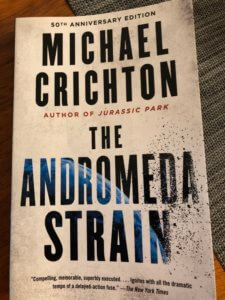
However, Crichton soon after became a best-selling author and gave up the idea of practicing medicine.
I read this novel because of a recommendation by a friend during Covid19…
Do I recommend this novel? No, I don’t and here are 5 reasons why:
- The novel puts forward an interesting premise, but not fully baked (I am pretty sure this novel would never get published today)
- Bland main characters. It’s hard to keep them straight, they all seem like the same guy (except they attended different Ivy League schools and have slightly different occupations)
- So-so tension, but nothing like one of his better books, Jurassic Park, for example
- Characters are all white dudes in lab coats and even the non lab-coat characters are all white dudes. *note…when THE ANDROMEDA STRAIN was turned into a film in 1971, the screenwriter changed one of the dudes to a female…even in the 70s the character line-up was thought to be way too monochromatic.
- Too much data and exposition and not enough heart. I felt nothing for all the people (except for the infant…who seems to be completely neglected)
Longer Review…
So…this novel became a best-seller and gave rise to a film that bears the same title. Both were hits/made a lot of money. In fact, this book catapulted Crichton’s career. I can only surmise that there was a great hunger for techno-thrillers at the time and that Crichton scratched an itch that had be itching for a long time.
The funny thing is, immediately following this read, I’m consuming Philip K. Dick’s, DO ANDROIDS DREAM OF ELECTRIC SHEEP and I am so wowed by the writing and how different it is from Crichton’s. Dick knew how to flesh out a character. Crichton did not, at least he didn’t yet. He got much better at it in subsequent novels, many of which I have enjoyed.
So, let me just nit-pick a little…
If I was ever to teach a writing class on the development of a writer…I might choose Crichton and force my class to read this book and then give them the pleasure of Jurassic Park as examples of how one gets better at the craft. THE ANDROMEDA STRAIN almost feels like a “freshman novel”, that novel written by an aspiring author who has one great idea, but can’t quite figure out how to tell the story.
In that class, I would also ask the students to read DO ANDROIDS DREAM OF ELECTRIC SHEEP, by Philip K. Dick, written in the same era.
There is a reason that BLADE RUNNER, a brilliant film and subsequent franchise, emerged out of Dick’s novel, published in 1968, one year before THE ANDROMEDA STRAIN.
The character of Rick Deckard is brilliantly written, fleshed out. The reader feels his pain, his angst, his story as he/she reads. Not only that, the secondary characters are complex, mysterious and full of emotion even when Dick writes about androids. His androids seem more human than Crichton’s actual human characters.
I do believe that Crichton saw his errors and improved immensely, but it will be a mystery to me for a long time that this book, THE ANDROMEDA STRAIN, was published and was sold and was read by so many, including me!
If for some reason you want to buy this book, click here.
To watch the film via Amazon Prime, click here.
KINGDOM, A Review of a Korean-Made Masterpiece

KINGDOM is brilliant.
Rated R for violence. No sexually explicit content at all. Not even a kiss. And yes, this is a zombie story, but with a twist, which I’ll explain in my longer review. However, be prepared for gore. I watched 2 seasons, but apparently a 3rd is being made to be released in early 2021.
First, the short review…
6 Reasons I Recommend KINGDOM
- Game of Thrones meets the Walking Dead. If the two stories got together and had a child, KINGDOM would be that child.
- Gorgeous costumes, especially the hats
- Palace intrigue galore
- Amazing performances by talented actors many of us have never seen
- A refreshingly different setting and world
- Lots of “scare” moments where you jump out of your seat. These filmmakers know the tropes and use them well.
 Now, for the longer review…
Now, for the longer review…
The story is based loosely on the Manga series, The Kingdom of the Gods by Kim Eun-hee and Yang Kyung-il. The story for television was written by Kim Eun-hee, directed by Kim Seong-hun.
Set in late 16th century Korea (The Joseon Period), Crown Prince Lee Chang, our protagonist, discovers a plot to unseat him. His father is ill and dying and the Queen Consort (not the Prince’s mother) is pregnant with a son…potentially. She and her father are angling for this newborn to take the throne. However, the King must not die from his illness before this child is born, so the the palace doctors are asked to keep him alive at all costs. There is an herb, called the resurrection plant, that must be administered to him in a particular way at death. From this herb, the brain comes back to life, but the creature that resides in the body now has an insatiable hunger for human flesh. Thus, the zombie angle.
The audience is introduced to this creature, the King in the first episode, so no spoilers here. The King is not only a zombie ready to devour any attendant who comes his way, he is being controlled, in chains, by the Queen’s family. She bans the Crowned Prince from seeing his father and although he suspects the King is dead, he cannot prove it. Knowing his life is in danger without his father’s protection, the Crowned Prince flees and while he goes into hiding, the zombie plague is carried to a small village through a body in a coffin, whose death was caused by the King creature.
As the Zombie plague spreads and begins to ravage the region, the Prince comes into his own, fighting to protect his people, but this is a complicated two-front war. The Prince is being chased by his step mother’s clan while fighting the zombie masses. While on the countryside, he slowly unravels the mystery surrounding the condition of his father and does eventually come back to the palace, face to face with the creature. I say no more, lest I spoil…

I loved the writing, all the dialogue is perfect and no scene is wasted. KINGDOM often reminded of Shakespeare, Hamlet in particular…That is how well put together these characters are and the stage is…well, many lovely locations in South Korea.
I cannot recommend this series highly enough. If you do watch it, drop me a line and let me know what you thought of it.
To watch the official trailer, click KINGDOM trailer
HANNA, A Review of Amazon Prime’s TV Series

I rate this series R, mostly for its violence. HANNA, created and written by David Farr, also portrays a disturbing picture of childhood, so if you have young children/teens who want to watch, you may want to preview this before allowing them to enter into the violent world of Hanna. Other than that, I highly recommend this series. It skirts the line that is science fiction and dystopian.
Short Review of HANNA. 6 Reasons You Want to Watch…
- Well written story and well-crafted characters
- Outstanding performances by Joel Kinnaman, Mireille Enos (they’re reunited here…having starred together in the award-winning detective series, The Killing.) Hanna is played by Esme Creed-Miles. She’s a British actor, but pulled off the German accent. I don’t think she actually speaks German, but she did speak French fluently. Kinnaman is Swedish. He also carried the German accent and spoke a lot of German to make this role believable.
- Timely. A US intelligence service, broken into factions, clawing at more power? Perhaps too real…
- Truth and morality emerge in the most unlikely places and the story reminds us of that.
- I love the way the characters rarely shout. Erik (Kinneman) and Hanna (Creed-Mills) both have this quality. They speak with intensity, but always quiet and measured, understated. I found myself loving this vibe more than I thought I would, maybe my Scandinavian roots…
- A story set in Europe, especially Berlin, London and Paris. Hurray, given we cannot travel there right now.
Longer Review
One of the things I liked about this production was its willingness to go slow. That might sound weird because the story moves at a pretty fast clip, but there is also time in each episode to absorb what is taking place in the character’s lives, in their hearts. I attribute part of that pacing to the editing. THANK YOU DIRECTORS AND EDITORS! It surprised me sometimes what was not put on the screen/what was skipped, but it also revealed what was most essential for the story. I found my brain willing to allow the holes in the plot because the true drama was not withheld from my view.
In season 1, the audience is introduced to Hanna as a baby, also to her mother and to her mother’s savior, Erik (Kinneman) who ends up rescuing Hanna from destruction. Erik, though German, is an insider with the US intelligence agency that is accepting babies in order to turn them into super assassins. Erik becomes Hanna’s guardian and the audience believes he might actually be her father. He isn’t. When Hanna finds out he has lied to her about his biological relationship to her, she is enraged.
Telling the truth is VERY important to Hanna. This seems consistent throughout and is refreshing as a character trait. It grounds the viewer, even when Hanna’s allegiance to the “good” or the “evil” entities in the world seems confusing. Hanna punishes those who lie to her, even when those individuals are her allies.
That dynamic of telling truth versus lying, or shrouding the truth reminds me of how teens (I’ve raised a couple and counseled many) have a nose for truth or fiction. They sense when adults are lying to them. Just tell me the damn truth and don’t protect me from it because you think I can’t handle it said every teen ever.
And I love that about them. I loved that about Hanna. She is so pure in that sense, the audience is ready to root for her in just about any circumstance, even when it feels like she is about to give in to evil.
Hanna has been renewed for a third season. I look forward to seeing how the writers develop this story.
